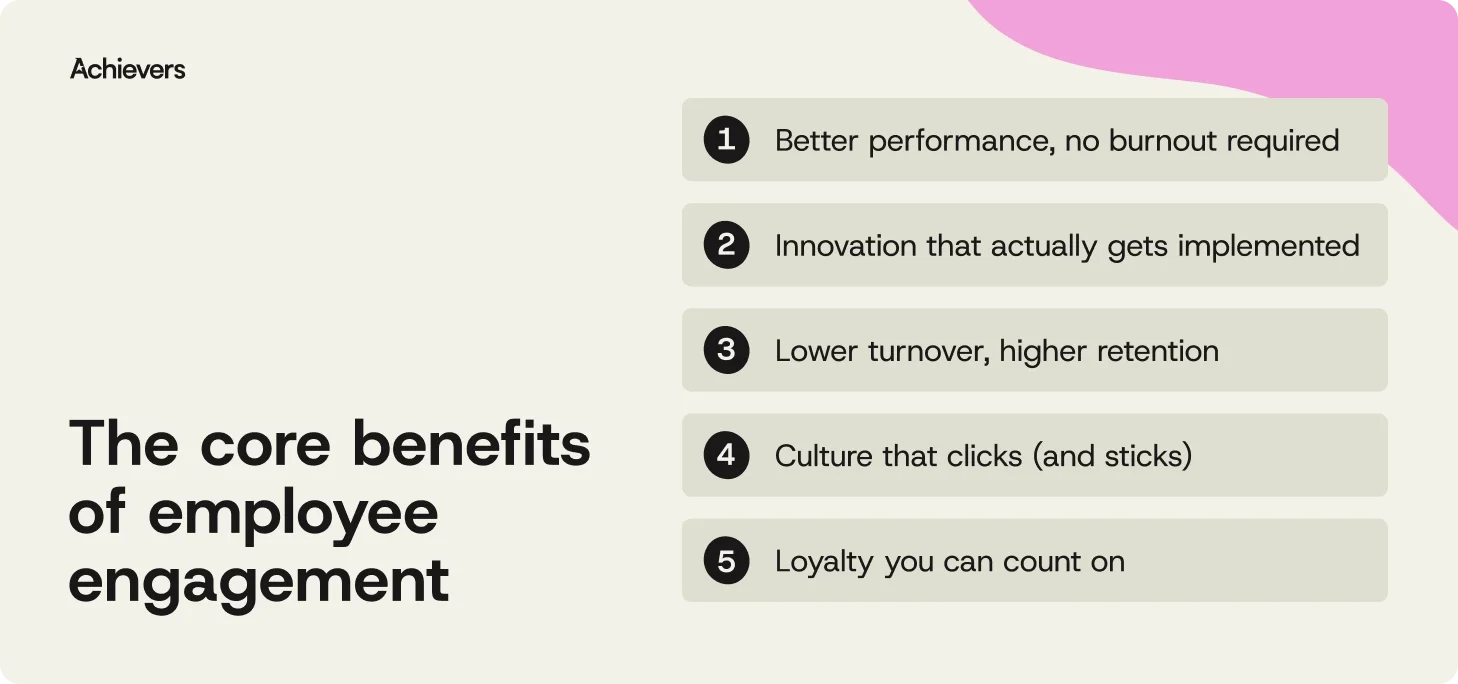Table of contents
Create a culture that means business™
Schedule a demo with an Achievers solution expert today.
You know a good employee when you see one. They communicate clearly, pitch in without being asked, give credit where it’s due, and actually seem excited to be at work (imagine that). If your entire company were made up of people like them? You’d be breaking performance records on autopilot.
But even if you’re lucky enough to find someone with the right mindset, motivation, and people skills, it only matters if your culture brings those traits to life. According to the State of Recognition Report, 91% of employees say they’d put in more effort if they felt valued. That’s your cue.
So, what should you be looking for — and how do you help those traits stick around? Let’s break down 25 employee traits that drive real performance and culture, plus how to spot and support them along the way.
25 good employee traits that drive culture and productivity in the workplace
Good employees don’t just get the job done. They raise the bar for everyone around them. But here’s the thing: those traits you admire most? They don’t happen by chance.
Let’s break down 25 good employee traits and how to bring out the best in your workforce, one behavior at a time.

1. Reliable and responsible
Good employees follow through — no micromanaging needed. They deliver what they say they will, ask questions when they’re unsure, and keep teams moving forward, including showing up on time, prepared, and ready to contribute. That kind of consistency builds trust across the board, especially in high-stakes or cross-functional work.
2. Accountable
Mistakes happen. What matters is how employees respond. Accountability means owning outcomes — the good, the bad, and everything in between. Employees who take responsibility set the tone for team integrity and continuous improvement.
3. Results-oriented
Busy is easy. Driving real impact takes intention. Results-oriented employees focus on goals, track progress, and push for outcomes that move the needle. They know what success looks like and keep it front of mind.
4. Strong time management
These employees respect their own time and everyone else’s. They prioritize well, meet deadlines, and manage workloads with intention — which keeps projects on track and stress levels down. They’re the ones who rarely need a reminder.
5. Resilient under pressure
When things go sideways, they stay steady. Resilient employees adapt quickly, keep perspective, and help teams recover without losing momentum. It’s not just about grit — it’s about composure, flexibility, and knowing when to ask for help.
6. Clear communicator
They say what they mean — no jargon, no confusion. Clear communicators tailor their message to the audience and make it easy for others to act. In meetings, emails, or Slack threads, they keep teams aligned and avoid unnecessary back-and-forth.
7. Great listener
It’s not just about waiting for their turn to talk. Great listeners are fully present, pick up on what’s said (and what isn’t), and ask thoughtful follow-ups. That kind of attention builds trust at work and surfaces insights others might miss.
8. Team player
They care more about team success than personal credit. Team players step in when needed, share wins, and help others level up. They make collaboration easier — and turn coworkers into people you actually want to work with.
9. Emotionally intelligent
They know how to read the room — and respond accordingly. Emotionally intelligent employees manage their own emotions, understand others’, and navigate tricky moments with empathy. That skill is key to smoother communication, stronger relationships, and better conflict resolution.
10. Feedback-friendly
They don’t flinch when feedback comes in hot. In fact, they seek it out. Feedback-friendly employees see critique as a growth tool, not a threat — and they give input just as thoughtfully as they receive it.
11. Professional and presentable
It’s not about dress codes. It’s about showing up with intention. Professional employees communicate respectfully, handle situations with maturity, and represent the company well. Whether they’re in a meeting or sending a quick email, they leave a solid impression.
12. Motivated
You don’t have to push them — they’re already moving. Motivated employees bring energy and drive to everything they do. They care about doing good work, not just checking boxes, and that kind of mindset tends to rub off on others.
13. Proactive
They don’t wait for someone else to fix it. Proactive employees spot issues early, flag what’s missing, and take ownership without being asked. That kind of initiative helps teams stay ahead instead of constantly playing catch-up.
14. Dedicated
They show up — even when things get tough. Dedicated employees care about doing the job right, not just getting it done. That steady commitment pushes teams through deadlines, pivots, and crunch time.
15. Creative thinker
These employees connect dots that others don’t. Creative thinkers bring fresh perspectives, ask unexpected questions, and challenge stale assumptions — helping teams innovate, not just iterate. It’s less about artistic flair, more about problem-solving with imagination.
16. Problem solver
They don’t panic when problems pop up — they get to work. Problem solvers break challenges down, explore options, and rally others toward the fix. They’re equal parts resourceful and resilient, which makes them invaluable in crunch time.
17. Adaptable and flexible
Change doesn’t throw them — it energizes them. Adaptable employees stay open, shift gears without drama, and help others stay grounded when things evolve (because they always do). They’re the kind of people you want around when plans change… again.
18. Eager to learn
They don’t assume they’ve got it all figured out — and that’s a good thing. Eager learners seek out feedback, ask smart questions, and keep growing their skills. That kind of mindset keeps teams sharp and future-ready.
19. Aligned with company mission
They’re not just here for the paycheck. Employees who believe in your mission statement are more engaged, more loyal, and more likely to go the extra mile — not because they have to, but because they care about the bigger picture.
20. Empowered
They take initiative because they know they can. Empowered employees understand their value, make decisions confidently, and feel trusted by leadership. That kind of confidence turns potential into real impact.
21. Positive attitude
Not the fake-it-’til-you-make-it kind — the grounded, can-do kind. Employees with a positive attitude handle challenges with perspective, lift team morale, and keep things moving forward when the mood dips.
22. Intellectually curious
They don’t stop at “how” — they want to know “why.” Curious employees dig deeper, connect dots, and explore new angles. That curiosity fuels innovation, continuous improvement, and better decision-making.
23. Honest and trustworthy
They do the right thing, even when no one’s watching. Employees with integrity earn trust, speak up when something feels off, and set the tone for ethical, transparent communication and overall work, which is critical for strong culture.
24. Leadership qualities
They influence without a title. Whether it’s guiding a project, mentoring a peer, or stepping up in a tough moment, employees with leadership qualities bring vision, clarity, and steady momentum to whatever they touch.
25. Recognition superstar
They see the good and say it out loud. Recognition superstars celebrate their teammates, reinforce core values, and help create a culture where great work doesn’t go unnoticed. They’re the heartbeat of everyday appreciation.
How to identify good employee traits — and help them grow
Spotting the right traits is just the beginning. If you want them to thrive (and spread), you’ve got to hire for them, recognize them, and measure what matters. Here’s how to make it happen:
Ask better questions to spot better traits
Forget trick questions or résumé regurgitation. Ask candidates to reflect on how they’ve handled feedback, conflict, or ambiguity. Look for examples that show curiosity, self-awareness, and accountability. These insights reveal how a person thinks, adapts, and contributes — especially in fast-moving or people-first environments. You’re hiring for behavior, not just background.
Use recognition to reinforce the behavior you want
Recognition is how good habits go viral. With Achievers, every recognition is tied to a core value or behavior, so it’s not just praise; it’s culture-building. Employees can recognize peers instantly across desktop, mobile, Slack, and Teams, and leaders can spotlight wins that model what great looks like. The result? Consistency, clarity, and connection.
Track culture in action with real-time data
Gut checks don’t scale — data does. Our recognition platform surfaces behavioral trends, recognition gaps, and participation patterns so you can see what’s working and where attention’s needed. You can break it down by team, region, or value, and connect the dots between recognition, engagement, and retention. It’s culture intelligence without the guesswork.
Build the workforce you want to see — one trait at a time
No one shows up to work fully formed. Traits like collaboration, curiosity, and resilience in the workplace? They’re learned and shaped by the culture around them.
That’s where HR comes in. When you make expectations clear and consistently recognize the behaviors that matter, you turn good habits into company-wide norms.
With Achievers, recognition becomes part of the everyday. Employees shout each other out in the moment, leaders reinforce what drives results, and HR gets the insights to scale what works. It’s how you turn great traits into your company’s competitive edge.



